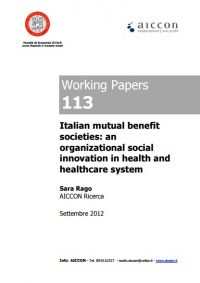113 – Italian mutual benefit societies. An organisational social innovation in health and healthcare system
Abstract
The paper aims to analyse the role covered by “Mutual Benefit Societies” (hereinafter MBSs – it. trans. “Mutue Sanitarie Integrative”) in terms of “social innovation” within the on-going changing of Italian welfare system.
In fact, several of these organisations survived the last three decades despite the establishment of the National Health Service (NHS) by Italian Law no. 833/1978. The law also allowed for the possibility to supplement services provided within the public system by private insurers, including MBSs. The opportunity for MBSs to establish supplementary health funds aimed at providing supplementary coverage has been confirmed by the Legislative Decree no. 502/1992 and subsequent amendments.
As the crisis of the public welfare system, MBSs working in health and social risks areas currently deal with both challenges and opportunities. The added value of MBSs emerges especially in high level social and health content services (e.g., long term care – LTC – services). It is related to the ability in linking economic (efficiency), social (relationships network inside MBSs – both with members and staff), cultural (connected with principles and values of their mission), and institutional (in terms of generation of social capital – external relationships) sides.
MBSs are a subsidiary and supplementary tool to already existing welfare policies addressing the demand for the integration of health and welfare costs. The shared goal is to combine the universality of welfare and the economic sustainability of the system, taken from the perspective of social innovation founded in civil society involvement. As “social innovation” is the application of new ideas on a product, process, or organisational arrangements producing an outcome or a stable and positive change in the level of well-being of a society or part of it through the creation of social added value, in the case of Italian MBSs, social innovation emerges from their organisational structure through which they are able to link the demand and supply of health. MBSs are able to tackle better than other types of organisations the problems of redefining intervention policies as they can organise it in a flexible way that more closely reflects needs and desires of members.
This paper is based on data collected through the administration of a survey questionnaire sent to a sample of 20 Italian MBSs working in health and healthcare fields.
JEL Codes: I13, I31, L31
Keywords: mutual benefit society, welfare, health/healthcare, social innovation, added value

